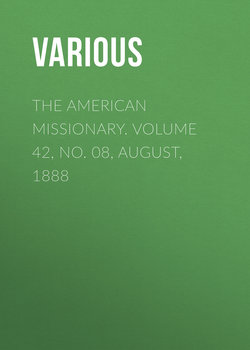Читать книгу The American Missionary. Volume 42, No. 08, August, 1888 - Various - Страница 3
*THE VERNACULAR. THE LAST GOVERNMENT ORDER.*
ОглавлениеTHE ORDER
We give below a copy of the last order received from the Interior
Department in relation to the vernacular.
"1st. In Government schools no text-books and no oral instruction in the vernacular will be allowed, but all text-books and instruction must be in the English language. No departure from this rule will be allowed, except when absolutely necessary to rudimentary instruction in English. But it is permitted to read from the Bible in the vernacular at the daily opening of school, when English is not understood by the pupils.
"2d. In schools where Indian children are placed under contract, or to which the Government contributes in any manner, the same rule shall be observed in all secular instruction. Religious instruction in the vernacular may be allowed in such schools, both by the text-book and orally, provided not more than one-fourth of the time is devoted to such instruction.
"3d. In purely mission schools—that is, in schools toward whose support the Government contributes nothing—religious and other instruction may be conducted in the manner approved by those who maintain the schools, provided that one-half of the school hours shall be employed in instruction in English.
"4th. Only native Indian teachers will be permitted to teach otherwise in any Indian vernacular, and these native teachers will only be allowed so to teach in schools not supported in whole or in part by the Government, and where there are no Government or contract schools where English is taught. These native teachers are allowed to teach in the vernacular only with a view of reaching those Indians who cannot have the advantage of instruction in English.
"5th. A theological class of Indian young men, supported wholly by mission funds, may be trained in the vernacular at any missionary school supported in whole or in part by missionary societies, the object being to prepare them for the ministry, whose subsequent work shall be confined to preaching, unless they are employed as teachers in remote settlements where English schools are inaccessible.
"6th. These rules are not intended to prevent the possession or use by any Indian of the Bible published in the vernacular; but such possession or use shall not interfere with the teaching of the English language to the extent and in the manner hereinbefore directed."
COMMENT
This order presents a great and gratifying modification of those extreme rulings of the Department which occasioned so much dissatisfaction among the churches. While we rejoice in these modifications, we must not conceal from ourselves or our readers the fact, that the main point against which objection has been so strenuously urged—the right of the churches to be guided by their own wisdom and experience in expending their own funds—is not granted by this order, as will be seen in Article 3. "In purely mission schools," "toward whose support the Government contributes nothing," it dictates that "one-half of the school-hours shall be employed in instruction in English." So far as the principle is concerned, nothing is yielded. The Government still assumes to control these schools, and to tell the missionaries how much of the vernacular they may use, and how they must divide the hours between the two languages.
The regulation, moreover, fixes upon "one-half of the school hours" without any obvious reason for taking that number rather than one-fourth or three-fourths, for it does not take into account the different conditions of the pupils as to their knowledge of the English language. It requires a double set of text-books if the vernacular be taught at all. Whether the churches will acquiesce in this regulation, will depend, we think, upon how rigidly it is enforced. We regret that the Government, while attempting to meet the wishes of the churches, could not have done it in a more broad and generous method, by conceding their right to manage their own missionary affairs without interference or dictation.
* * * * *
The numerous solicitors from the South for the benefactions of our friends at the North impel us to increased caution in regard to our endorsements. We are anxious that our friends should give, but we are equally anxious that they should not be imposed upon. Hereafter, we shall give a letter of commendation to any of our workers who may be authorized by us to come North for help, signed by one of the Secretaries or one of the District Secretaries, and these will be good for one year from the date, and any pastors or friends of the Association can feel at liberty to ask for the letter. If persons assuming to solicit funds for any part of the A.M.A's work cannot produce such letters, the failure may be taken as a reason for withholding confidence. We think this is due to our friends at the North and to our faithful and honored workers at the South.
* * * * *
Professor Lawrence, of Jellico, Tenn., who was so seriously injured by an unprovoked and cowardly attack, is, we are happy to learn, slowly improving. Suffering, both from excruciating pain and from great nervous prostration, all that a human being can endure and live, yet he has borne it uncomplainingly. Large expenses have been necessarily incurred for surgeon's, doctor's and nurse's bills, and Mr. Lawrence is a poor man, working on a missionary salary, when he might have received more elsewhere. As Professor Lawrence received his injuries in the simple discharge of his duties as a teacher in an A.M.A. school, our Committee will feel it their duty to render him some pecuniary aid, and if any of our friends are disposed to assist us in rendering such help, we shall be glad to receive their donations for that purpose.
* * * * *
